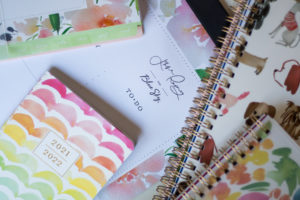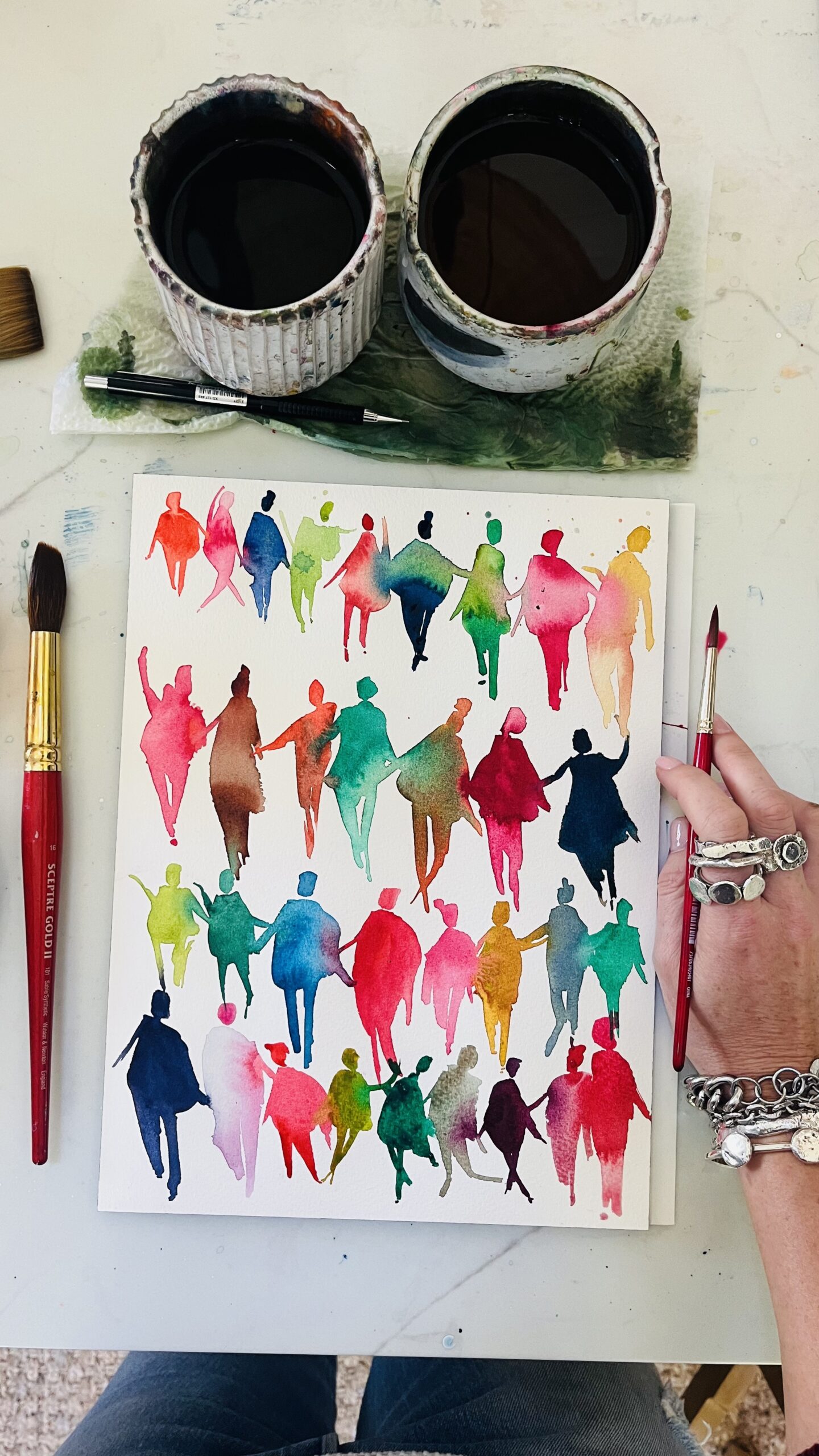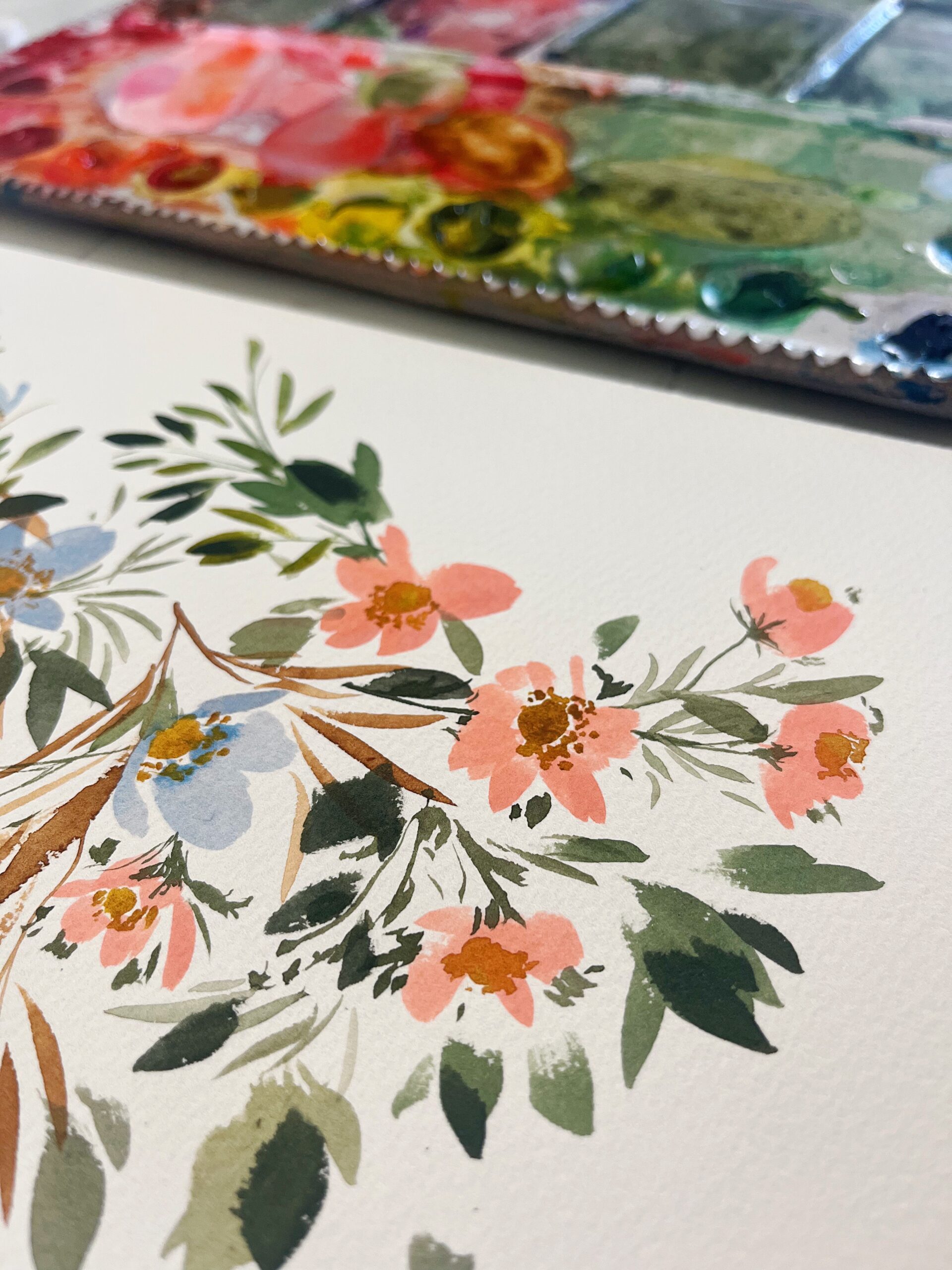When I decided to start a creative business, I didn't even know where to begin. Should I start with the legal stuff? Money stuff? Website stuff? Instagram handle?
Today I’m sharing tools you need in order to start an art business! This could be a “creative business essentials” list of the things you need to have. (Ex: Business name, branding, invoice system, pricing/packages, etc)
Ideation Phase:
Many creatives, myself included, start a business because they have some sort of interest in what they’re creating or making. For me, painting was a hobby-turned-side-hustle because of some friends who were getting married and decided they liked my hand lettering. Sometimes a business can come about because the current job is a soul-sucking office job, or because there’s no viable option in sight. Whatever your starting point is, it’s important to do some research and write your ideas, strategies, competition and dreams down.
This could be as simple as jotting your goals down in a journal, or filling out a SWOT analysis for your company or idea. When I started my business at the ripe age of 23, I completely skipped this phase. Not intentionally, I just didn’t even think about it or know it existed. This is one major step I wish I would’ve taken when I was starting out as it would’ve helped me get clear on what I want to offer, who I want to offer it to, and what obstacles and unique abilities I have as a business owner.

The Building Phase
Once you’ve gone through the ideation phase of starting a creative business, it’s now time to get serious. There’s a few legal and financial steps that every business owner needs to take in order for the government to take your business seriously. It’s definitely a headache, but here are some questions and steps that will help you get this going:
1. IS YOUR BUSINESS NAME AVAILABLE?
First step when starting a business: pick an available name! Ok. This might seem super straightforward, but it’s not just about making sure the Instagram handle is available, people.
What I mean is, you’ll start by picking a company name that is available and isn’t trademarked. A trademark is the exclusive right to use a company name. The company that owns the trademark for the name is the only one who can use it. If you use a trademarked name, you could be sued or forced to rebrand which can not only be expensive, but incredibly time-consuming!
So, let’s pretend I was thinking about starting a business and I liked the name “googley eyes paperie.” I go on Instagram, the handle’s available (“OH SICK!”) so then I check Google and the domain is ALSO available (“EVEN SICKER!”).
Well guess what?! It doesn’t matter if the LLC name or DBA name, the Instagram handle, or domain is available. If someone else owns the trademark for “googley eyes paperie,” it’s still not a good idea for me to use that name. Someone else can own the Trademark for that name! So, you’ll want to run a trademark search to make sure your name is available. Otherwise, you might be registering a company name that you can’t legally use. Don’t worry, I’ll tell you how to do that in a little bit.

2. REGISTERING YOUR COMPANY
Once you find an available trademark, the next step is to register your company.
LLCS + CORPORATIONS
If you meet with your accountant and it makes financial sense for you, you may want to register your business as a legal company, instead of just being a sole proprietor.
The biggest reason or benefit to becoming an LLC or Corporation is limited liability. If you don’t register your business as a legal company, then you and your business are the same person. You’re personally liable for everything that happens in the business. Your personal assets are considered company property. You may have to use your house, car, or bank account to pay for business debts, contracts, and lawsuits. If you do register as an LLC or Corporation, then you and your business are separate people. You aren’t personally liable for business debts that you might owe or lawsuits. Your personal assets are considered separate from the business. For example, if you get into a car accident with a company car, or you are unable to pay back a business loan, or someone files a lawsuit against you for copyright infringement, etc. you won’t need to use personal assets to pay business debts!
Meet with a good attorney (I work with Framework Law Group) and think about how much it costs to form a company in your state and how much risk you have. Each business is going to be different, so this is why it’s crucial to meet with an attorney and consult your account on this matter!
DBAS
You may need to file a DBA or a Doing Business As with your city/county. You typically need a DBA if you’re not registering your company as an LLC or Corporation AND your business name is different from your personal name. You also need a DBA if you are registering your company as an LLC or Corporation and you’re using a different brand name than the registered name. You’ll typically file a DBA with your county or state, so a little Google research will help point you in the direction of where to register for a DBA if necessary.
TAX IDENTIFICATION NUMBER
Once you file an LLC or DBA, you’ll want to obtain a tax identification number or EIN from the IRS. This is how you file your taxes as a business. When you’re a sole proprietor, your tax identification number is your SSN, but once you form an entity, you’ll need to obtain an EIN. You can do it online through the IRS, and it’s pretty simple.
DOES YOUR BUSINESS NEED A BUSINESS LICENSE?
Many cities and counties will require you to file a business license. This is the paperwork you need to do business in that city/county. Some cities require it for everyone. Some only require it for certain industries. Head to your city or county website to see if you need a business license. Typically, you can file a business license online or head into your city or county office to file in person.
SALES TAX
Read your state tax website to see how to register with your State Tax Board. Find out your state and local sales tax laws to determine if your products need to be taxed.
BUSINESS BANK ACCOUNT
It’s so much easier to keep all business income + expenses in one place. Trust me. When I first started my business, I had all of my business income and expenses co-mingled with my personal. It was a bookkeeping and accounting NIGHTMARE! When it’s time to file business taxes, you’ll want to have it separate so you can calculate how much you spent on your business. It gets SO messy when you keep it all together. Make things easy on yourself and set up a separate account!
It’s also necessary to keep your limited liability separate as an LLC or Corporation. If you want your business to be separate, you have to keep your money separate! Sounds pretty straight forward, but so many creatives never think about this.
3. PROTECT YOUR BRAND
If you’re an artist and looking to get into licensing, some manufacturers and companies require that you trademark your brand. As mentioned before, a trademark is the exclusive right to use your company name, logo, or tagline. In other words, that means you’re the only one who can use it. Once your company starts doing well, you may start to see other companies popping up with similar branding. They’ll confuse your potential customers and steal sales and without a trademark. There’s no way to stop them!
Only one company can own a brand and it’s typically who trademarks it first. If another company trademarks your brand first, they’ll own your name nationally. You’ll have to rebrand or file an expensive lawsuit which, as mentioned before, can be expensive and incredibly time-consuming. That’s why a trademark is so important.
REVIEW YOUR BRAND
Some words and phrases can’t be trademarked because they’re free for anyone to use.
It’s crucial you pick a name that is available and can be trademarked. Even if you can’t afford it (the trademarking process can get expensive!) or don’t want to trademark the name right away, it’s always a good idea. For example, when I first started, I had no idea I’d get into licensing one day and would need a trademark because of the manufacturers I work with. Had I picked a business name years ago that I just liked, but couldn’t own the trademark, I'd definitely run into issues.
So, how do you find out if a trademark is unused? You run a Trademark search!
Related: Legal Steps to Take When Starting a Business (with more info on running a Trademark search)
Once you get all of that legal stuff out of the way, it’s time to get some systems in place so you can run an efficient and successful business!:
The Execution Phase
Are you offering products or services? Once you define what you offer, you’ll now be clear on what type of platforms and credit card processing systems you’ll need to start accepting payments! When I was a wedding stationery designer, I used Quickbooks to send and receive invoices and payments from my clients. If you are in the business of offering products, are they digital or physical? Will you need shipping supplies? PaperMart is a great place for purchasing wholesale shipping products.
If you have multiple projects and/or client jobs going on at once, you may need a project management software to help you keep track of deadlines, project notes, etc. We use Asana and I have a full BTS look at how we have our Asana set up in this Instagram Story Highlight!
There are so many ways and methods for operating a creative business, but one thing that consistently helps businesses thrive is organization. As a solopreneur for the first 5 years of running my business, I was incredibly frazzled and unorganized. I avoided all things finances because it scared me, and I had no tracking or system in place for when I answered emails, following up with clients, sending invoices, tracking deadlines and more. I was constantly stressed and felt like my business, though it was very busy and “thriving” in that sense, was on a razor thin edge between making it and complete failure. Setting up these systems early on in your business is SO crucial. Create these habits right off the bat and you’ll have a lot more clarity with your creative business!
Click HERE to head to my Instagram where you can join my Broadcast Channel on my Instagram where I share more business tips like this!









Dear Jenna : I am 70 & wanting to film my calligraphy lessons to possibly do zoom classes with students wanting to take private lessons so I can stay home to teach & esp with my age & Covid . The tech stuff is so difficult for me to understand but everyone says I need to do it to teach from home . Which would be best to research: Weebly & Square or Shopify ? For a beginner . I don’t do Facebook or any social media & really don’t want to . I love watching you paint ! Blessings & Gratitude : Deborah
I would try to start simple! And if you’re not on social media, think about where your audience is coming from. That is important for planning the sales flow. I don’t have direct experience with the ones you mentioned but I’ve heard great things about Shopify. And if you’re wanting them to schedule a specific appt and pay, you can also look into Calendly or Acuity and integrating that with a payment processor. Also, if you want to reach a lot of people without all the set up and marketing, teaching on a platform like Skillshare could be worth looking into. Anyway, I hope that helps get the wheel turning!